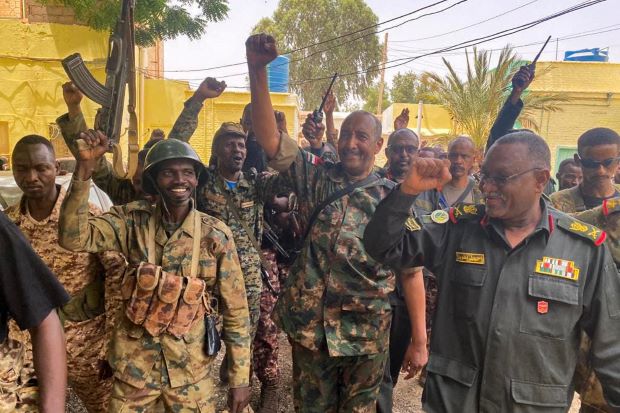Sudan’s army withdraws from ceasefire talks

By Abdi Latif Dahir
NAIROBI, Kenya — Sudan’s army has withdrawn from talks aimed at achieving a full ceasefire and delivering humanitarian aid across the country, it said on Wednesday (May 31), raising the spectre of escalating clashes as a war between rival generals rages for a second month in Africa’s third-largest nation.
The talks, facilitated by Saudi Arabia and the United States, were the only major ongoing official effort to mediate between the Sudanese army and its paramilitary rival, the Rapid Support Forces (RSF). The army’s withdrawal from the talks deals a blow to the attempts to decisively end the war, which has released a paroxysm of violence and chaos that have killed hundreds of people and displaced millions more.
The army said in a statement posted to its Facebook page that it was suspending its participation in the talks because the paramilitary forces had failed “to implement any of the provisions of the agreement and to continue violating the armistice.” The paramilitary group said on Twitter that it was “unconditionally” backing the Saudi and US-led initiative, and that the violations by the army had “not deterred us from honouring our commitments.”
The talks began in the Saudi port city of Jeddah in early May and achieved limited results between the rival groups. The two sides first allowed for aid to come through and later agreed to a seven-day ceasefire that began on May 22. That truce was then extended for five days on Monday (28) as both parties considered ways to allow for deliveries of more aid, the restoration of services like water and electricity, and the evacuation of their forces from urban areas including civilian homes and hospitals.
But even as the talks progressed, forces from the two sides continued to clash, including on Wednesday, with street fighting, drone attacks and airstrikes decimating the health care system and pushing civilians to continue to evacuate the capital, Khartoum, and the adjoining cities of Omdurman and Bahri.
In recent days, the fighting also intensified in El Obeid, the capital of North Kordofan state, according to residents. On social media, each side continued to accuse the other of breaking the cease-fire.
Renewed clashes have also torn through the western region of Darfur, pushing thousands of people to flee and cross into neighboring Chad. This is particularly true of El Geneina, a city in West Darfur where the health facilities have been shattered and all 86 gathering camps for displaced people have been razed to the ground, according to the UN Office for the Coordination of Humanitarian Affairs. A communications blackout has also kept the region cut off from the wider world for more than a week, raising fears of unreported deaths and the unfolding of a dire humanitarian crisis.
The conflict, which began on April 15, has led to the killing of 865 people and the injury of 3,634 others, according to the Sudan Doctors’ Union. Almost 1.4 million people have been displaced, with 360,000 of them crossing into neighbouring nations like Egypt, Ethiopia and South Sudan, according to the United Nations’ refugee agency.
Organizations for journalists and local activists have also accused the warring parties of increasingly targeting their members with home raids and arrests. Factories, banks and small businesses have been looted or destroyed, further damaging an economy that was already ailing from high inflation, spiking food prices and the devastating impact of the COVID-19 pandemic. The U.N. said this past month that it would need $2.56 billion to assist those affected.
The army, controlled by Gen. Abdel Fattah al-Burhan, and the paramilitary Rapid Support Forces, led by Lt. Gen. Mohamed Hamdan, were long on the same side. In 2019, they helped remove the dictator Omar al-Bashir, who had held power for three decades. They also carried out a coup that toppled the civilian government in October 2021, effectively scuttling the country’s nascent efforts to transition to democratic rule.
But over the past year, the two leaders began to fall out as they vied for supremacy over the northeast African nation — tensions that resulted in open warfare in the capital last month.
As talks for a ceasefire were held in Saudi Arabia, leaders from the African Union and the Intergovernmental Authority on Development, an eight-nation regional bloc that includes Sudan, also hoped to agree on a road map for future political talks that would bring in various stakeholders including civilian participants. Efforts by the U.N. mission in Sudan to support the country’s democratic transition were also recently thrown into limbo, when al-Burhan called on its head, Volker Perthes, to resign.
On Tuesday(30) evening, the army released a video in which al-Burhan appeared among a group of cheering soldiers, saying the military was yet to use its “maximum strength.” He added: “But if the enemy does not comply and does not respond, we will be forced to use the strongest force that we have.”
With the breakdown of the talks in Jeddah, observers are now worried about a protracted conflict that could have serious regional ramifications.
“Sudan is not getting the high-level attention needed to prevent another failed state in the region,” said Alan Boswell, the Horn of Africa director at the International Crisis Group, a research organization. “Sudan is collapsing and, thus far, no one seems to be able to do anything to reverse it.”
-New York Times


Comments are closed, but trackbacks and pingbacks are open.